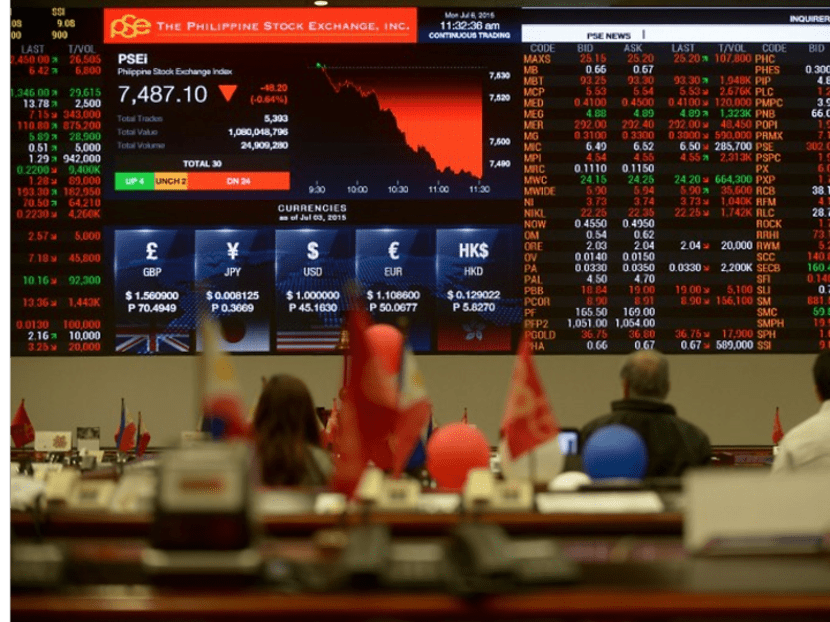Commentary: HSBC executive’s cavalier attitude to climate change might be shared by many
An HSBC presentation titled “Why investors need not worry about climate risk” raises the chilling idea that one of the largest and most influential sectors of the global economy is unconcerned about climate change, say researchers.

SINGAPORE: When Stuart Kirk, global head of responsible investing at HSBC, delivered a presentation titled “Why investors need not worry about climate risk” at a Financial Times conference in May, he touched a nerve in the finance industry and global arena alike.
Alluding to decades spent in the finance industry, Kirk said, “There’s always some nut job telling me about the end of the world”, in front of a slide headlined “Unsubstantiated, shrill, partisan, self-serving, apocalyptic warnings are ALWAYS wrong”.
The presentation sparked backlash in the global finance community, while HSBC quickly distanced itself from his statements. Chief executive Noel Quinn said Kirk’s remarks were “inconsistent with HSBC’s strategy” and “do not reflect the views of the senior leadership of HSBC”.
Just three days after the speech, Kirk was suspended from his role.
There are two ways to read this turn of events. One is that Kirk’s remarks were simply the provocations of an executive gone rogue. His suspension set the record straight, and financiers working hard on the green transition will carry on.
After all, green finance – finance that aims to better the environment or prevent further harm to it – is in vogue. The green bond market is projected to double in size to hit US$1 trillion by the end of this year, then US$5 trillion in 2025.
Financial institutions, regulators and citizens not only see the potential of green investing, but are also spurred by scientists’ warnings that the world is on track for 1.5 degrees Celsius of warming by 2040.
But the other interpretation of the Kirk saga is that he revealed unspoken truths accepted by a silent majority in the finance industry, the suspension being a cover-up to maintain the green pretences he had railed against.
If this is true, we must face the chilling idea that one of the largest and most influential sectors in the global economy is fundamentally unconcerned about climate change.
FINANCIAL MARKETS FACE ‘TRAGEDY OF THE HORIZON’
A key premise of Kirk’s argument is the short time horizons of financial institutions. Since the average loan length at big banks like HSBC is six years, “what happens to the planet in Year 7 is actually irrelevant to our loan book,” he said.
Factually speaking, Kirk is right. But it reveals a different truth from the one he probably intended: If climate change is not a financial risk, it is because financial markets are structurally incapable of taking into account the long-term risks from climate change.
Indeed, the problem of time horizons is precisely what former Bank of England governor Mark Carney – one of the targets of Kirk’s polemic – raised in his 2015 speech, Breaking The Tragedy Of The Horizon, which is widely credited as setting the agenda for green finance today.
Carney explained, “impacts of climate change will be felt beyond the traditional horizons of most actors – imposing a cost on future generations that the current generation has no direct incentive to fix.”
In other words, financial valuations do not account for the risks of climate change. There is little to dissuade financial actors from investments that may be highly profitable in the short-term, such as fossil fuels which are currently booming due to high energy prices, but will lock in emissions for many decades to come.
Short time horizons are a structural feature, rather than a bug, of financial markets.
CLIMATE CHANGE CAN’T SIMPLY BE LEFT TO THE MARKET
Kirk’s focus on the short-term also rests on a long-term outlook of perpetual, linear growth. Here, his argument moves to a higher register.
He asserts that just as the last hundred years have seen monumental economic and technological progress, so too will the next hundred years. Humans will adapt to climate change and find ways to profit from it.
But fixating on long-term growth obscures the fact that the last few decades were no smooth journey of progress and development. It was interspersed with major crises - the oil shocks of the 1970s, the 1997 Asian Financial Crisis, the 2008 Global Financial Crisis and the COVID-19 pandemic today.
Kirk's belief we all profit in the long run is a Panglossian take on Keynes’ famous aphorism “in the long run, we are all dead”.
It's worth remembering what Keynes wrote next: "Economists set themselves too easy, too useless a task if in tempestuous seasons they can only tell us that when the storm is long past, the ocean is flat again."
What this tells us is that we should not assume our long-term problems simply sort themselves out. Our long run is conditioned by what we do in the immediate present.
This is as true for climate change as it is for other urgent issues, such as inflation. To achieve net zero emissions by 2050, McKinsey estimates an additional US$3.5 trillion in climate investment is needed annually, and it will need to be front-loaded and significantly ramped up within the next decade.
Enormous climate investments will be needed in the short run to reap benefits in the long run. Such a temporality is out of sync with that of financial markets.
WHAT HAS GREEN FINANCE REALLY ACHIEVED?
In Kirk’s confidence that humans will be able to innovate their way out of climate change, he overlooks the inequality between countries’ vulnerability to climate risks.
Over half of the world’s countries most susceptible to sea level rise are in Asia, Singapore included. But unlike Singapore, not every country has large financial resources to dedicate to climate change adaptation.
Less developed, food-insecure countries like Zimbabwe or Zambia face less favourable circumstances. Debt constraints imposed on them by financial institutions make it more difficult to secure the green investment needed to build resilience against climate change.
Kirk’s glib remark that “Amsterdam’s been six metres underwater for ages and that’s a really nice place” doesn’t apply across the board.
This brings us to the elephant in the room. Seven years from Carney's seminal speech, the sustainable finance agenda has gone mainstream, but whether it has made positive contributions is still questionable.
Financing fossil fuels and other dirty assets continues on a massive scale: Despite the Paris Agreement coming into effect in 2016, fossil fuel financing from the world’s largest banks have amounted to US$4.6 trillion since.
The sustainable finance landscape also remains plagued by charges of greenwashing, where companies make misleading claims about their environmental contributions without any real change to their business models.
These flaws provide the opening for Kirk's cynicism, and explain why his jibes at the hollow words of green financiers are not entirely misplaced. His presentation is a wake-up call to regulators to steer finance flows towards real decarbonisation.
To do so, green finance must aim to reduce the cost of capital, increase access to liquidity and improve governance practices for green projects, as a new study by the Oxford Smith School points out.
Accomplishing this will require doubling down on the tools of green finance, such as green bonds, better reporting standards and an official taxonomy to accurately classify green assets – efforts already in the works in Singapore.
To this end, it is strong regulatory institutions, not the fictions of the free market, which are paramount.
Bertrand Seah is a co-founder of the Green Swan Initiative and a research assistant at the Asia Research Institute. Leanne Chee is a double degree student at Yale-NUS and NUS Law School.











